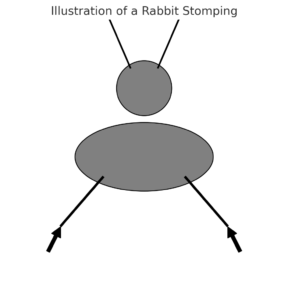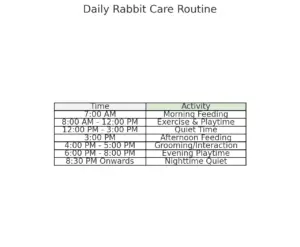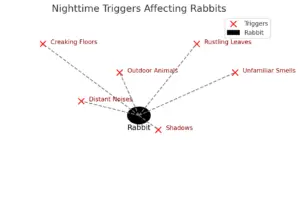Rabbits are expressive and sensitive creatures, and their behaviors often carry important messages. If your rabbit is stomping at night, understanding why and addressing the root cause is essential for their well-being and your peace of mind. In this article, we’ll explore the reasons behind this behavior and offer actionable solutions to help your rabbit feel secure.
Understanding Rabbit Stomping Behavior
What Does Rabbit Stomping Mean?
Rabbits stomp their hind legs to signal danger, express anxiety, or communicate with other rabbits. In the wild, stomping warns their group about predators. Domesticated rabbits still retain this instinct, even in safe environments.

Why Do Rabbits Stomp at Night?
Here are the most common reasons for this nighttime behavior:
- Perceived Threats
- Rabbits have heightened senses, particularly hearing. Noises like creaking floors, outdoor animals, or distant car horns can feel threatening.
- Stress or Anxiety
- Environmental changes or new smells can cause distress, leading to stomping.
- Loneliness or Attention-Seeking
- Rabbits are social and may stomp if they feel isolated at night.
- Discomfort or Pain
- Illness or an uncomfortable habitat might provoke stomping behavior.
How to Address Nighttime Stomping

Step 1: Minimize Perceived Threats
To make your rabbit feel secure:
- Keep their enclosure in a quiet area, away from loud appliances.
- Use white noise machines or soft background sounds to mask sudden noises.
Step 2: Create a Stress-Free Environment
Rabbits need a comfortable, enriching environment to feel at ease:
- Provide hiding spaces like tunnels or boxes to give them a sense of security.
- Avoid sudden changes in their routine or surroundings.
Step 3: Socialize and Exercise
Social interaction and physical activity can reduce loneliness and release energy:
- Spend time playing with your rabbit daily.
- Provide toys or treat puzzles to keep them entertained.
Step 4: Monitor Their Health
If stomping persists, consider a health check:
- Look for signs of illness like lethargy or lack of appetite.
- Regularly clean their enclosure and ensure they have proper bedding.
The Role of Rabbit Instincts in Stomping
Rabbits stomp to communicate, and it’s essential to respect this instinct. They may hear or sense things you cannot due to their highly sensitive hearing and natural alertness. Recognizing this behavior as part of their survival mechanism will help you better empathize with your pet.

Tips for Preventing Nighttime Stomping
Follow these tips to reduce nighttime stomping:
- Stick to a Routine: Feed, play, and interact with your rabbit at consistent times.
- Comfort Items: Provide soft bedding, blankets, and familiar scents.
- Quiet Enclosure: Cover part of their enclosure to mimic a den-like space.
- Daily Exercise: Let your rabbit hop around during the day to tire them out.
- Be Observant: Learn your rabbit’s behavior patterns and adapt as needed.
FAQs
Why do rabbits stomp their feet at night?
Rabbits stomp to signal danger, express anxiety, or seek attention. It’s a natural behavior driven by their instincts.
How can I stop my rabbit from stomping at night?
Provide a quiet, secure environment, enrich their living space, and ensure they get enough social interaction and exercise.
Does stomping mean my rabbit is scared?
Yes, stomping is often a sign of fear or alertness. It’s their way of warning others or expressing stress.
Can health issues cause a rabbit to stomp?
Yes, pain or discomfort can cause stomping. Look for signs of illness and consult a vet if needed.
Is it normal for rabbits to stomp frequently?
Occasional stomping is normal, but frequent stomping may indicate stress, fear, or health concerns. Address the root cause.
Conclusion
Understanding why your rabbit is stomping at night is the first step to addressing the behavior. By minimizing threats, creating a comfortable environment, and sticking to a consistent care routine, you can help your rabbit feel safe and secure. This ensures a restful night for both you and your furry companion.

Hi, I’m Sondip,
I’m a writer who loves to help people solve their problems. I write about small animals like mice and other small animals and even pests.
